How Bail Bonds Work
A bail bond is a written promise that the jailed defendant who is named in the document will return to court for the trial date. It may be issued by the defendant him- or herself, by family or friends, or by a bondsman. The bond allows the defendant to be released from jail and to remain free until the specified date.
How the Bond Works
When the bond is posted, the court clerk issues a document to the police, indicating that the bail has been posted. Upon receipt of the document, the police will grant bail to the defendant. For a defendant who is judged to be a bad risk to return to court, perhaps because of numerous arrests, bail may be denied. A good risk would be a defendant without a prior criminal record who has lived for some time in the community.
Bail Bondsman
Many defendants are unable to post bail for themselves, so they or a friend or relative may contact a bail bondsman to get the defendant out of jail. The bondsman’s bail bond guarantees payment of the specified amount in the event that the defendant does not return to court on the court-ordered date. The money named in the bond is actually the guarantee that the newly released person will show up in court.
Guarantees Cost Money
The last thing a bail bondsman wants is a defendant who does not show up in court on the specified date. To help defray such a possibility, the bondsman charges the defendant or a member of the family or friend a percentage of the total cash amount of the bond, usually about 10%, such as $1,000 for a $10,000 bond. However, what happens if the defendant does indeed not show? In most states, the bondsman has the right to track down the person and bring him or her to court. Five states – Illinois, Kentucky, Nebraska, Oregon, and Wisconsin – have laws against posting bail for profit, which makes the bail bondsman’s job illegal.
When a person has been arrested and faces time in jail, the advantage of the bail bondsman is obvious, and it is expressed in one word: time. Most people, no matter what the charge when arrested, have the same first and obvious desire, to get out of jail as quickly as possible. So, what the bondsman sells is time. It may be in the middle of the morning or the middle of the night, but time is the bondsman’s biggest asset. The good bondsman delivers the money quickly, and the defendant goes free – until the specified date.
In some instances and under some circumstances, a defendant may be required to post other collateral, such as the mortgage on a house, in addition to a bail bond. Once the bond has been issued, it is said to be “exonerated” upon the defendant’s conviction or acquittal. If the defendant “jumps bail,” meaning he or she does not show up at the specified court time, the bail bond is forfeited.


